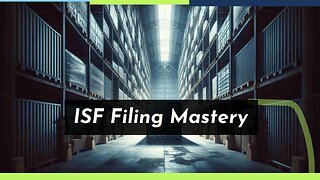Premium Only Content

Securing Trade: A Dive into Importer Security Filing and Customs Bond
ISF Depot // 661-246-8217 // [email protected] // www.isfdepot.com
In today's episode of our customs brokerage series, we discussed the role and importance of Importer Security Filing (ISF) in customs border control cooperation. ISF is a mandatory requirement introduced by the US Customs and Border Protection (CBP) to enhance border security and facilitate risk assessment. It is an electronic filing that importers or their customs brokers must submit to CBP before the goods are loaded onto a vessel destined for the United States.
ISF includes detailed information about the imported goods, such as the importer of record, consignee, supplier, country of origin, and other data that helps CBP assess potential risks associated with the cargo. By gathering this information in advance, CBP can conduct targeted risk assessments and identify potential security threats before the goods even arrive at the border.
In addition to ISF, another important aspect of customs brokerage is the customs bond. A customs bond acts as a financial guarantee between CBP and the importer or customs broker, ensuring that the duties, taxes, and fees will be paid and that all applicable customs regulations will be followed. Both ISF and customs bonds play crucial roles in ensuring customs compliance and facilitating efficient customs clearance processes.
Without a customs bond, importers may face delays and penalties, which can have significant consequences on their supply chain operations. Customs border control cooperation relies on the implementation of ISF and customs bond requirements, fostering a partnership between governments, importers, customs brokers, and other stakeholders. By adhering to these regulations, countries can regulate and secure their borders while enabling efficient trade flows.
In conclusion, Importer Security Filing and customs bonds are fundamental aspects of customs brokerage. They enhance border security, enable effective risk assessment, and facilitate efficient trade operations. Importers who comply with these regulations can ensure smooth customs clearance processes and maintain a strong partnership with customs authorities. Stay tuned for our upcoming videos, where we will explore more fascinating topics related to international trade and customs regulations.
#usimportbond #isfcustomsbroker #uscustomsclearing #isfentry
Video Disclaimer Here: This tutorial is independent and not affiliated with any US governmental entities.
-
 4:50
4:50
ISF Depot
7 days agoUnlocking Success: The Power of Accurate Tariff Codes in ISF Filing
31 -
 8:11
8:11
MattMorseTV
14 hours ago $3.31 earnedTrump's DECLARATION of WAR.
6.45K44 -
 3:44
3:44
GritsGG
13 hours agoUpdate Your Warzone Loadouts w/ These Tips!
9391 -
 2:31:01
2:31:01
The Connect: With Johnny Mitchell
15 hours ago $1.28 earned"It's About To Get Worse"- CIA Agent Andrew Bustamante Explains Why It's Time To Leave America
2.24K9 -
 36:28
36:28
TruthStream with Joe and Scott
1 day agoMark Attwood joins TruthStream in Ireland!
4.87K30 -
 2:13:30
2:13:30
Side Scrollers Podcast
1 day agoUK Introduces MANDATORY Digital ID + Dallas ICE Shooting BLAMED on Gaming + More | Side Scrollers
189K50 -
 LIVE
LIVE
Lofi Girl
2 years agoSynthwave Radio 🌌 - beats to chill/game to
159 watching -
 2:26:44
2:26:44
Tundra Tactical
7 hours ago $9.97 earned🎉 Pro-2A Party LIVE! | Zeke Stout Joins The Show With Tacoma Tactical
15.5K -
 2:36:47
2:36:47
BlackDiamondGunsandGear
9 hours agoAFTER HOURS ARMORY / The LEFT are Recruiting / Join the Leftist Gun Club?
7.13K8 -
 16:07
16:07
Ken LaCorte: Elephants in Rooms
13 hours ago $2.84 earnedWhy firefighting got political
12.6K4